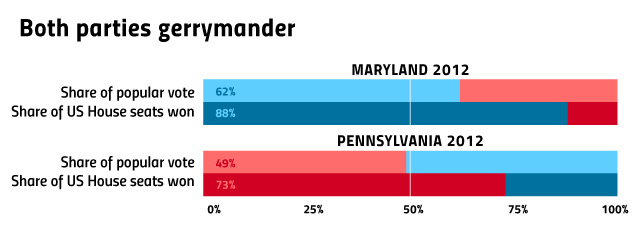Why is Gerrymandering a Problem?
Instead of voters choosing politicians, it's the other way around – politicians are choosing their voters. They do it by gerrymandering voting districts to guarantee their own re-election. That's corruption at the core of our political process.
What is the Definition of Gerrymandering?
Gerrymandering is when election district lines are drawn in a way that artificially advantages one person, party, or group over another – and it's a big reason why our elections aren't fair and competitive.
One of the most common types is partisan gerrymandering, where district lines are drawn strategically around groups of people that reliably vote for one party. As a result, the party drawing the lines gets more representatives elected than they would with fairly drawn districts.

Both parties use gerrymandering to give themselves a leg up in the next election. Republican legislatures conducted a wave of gerrymandering in 2011, and Democrats have engaged in gerrymandering where they have control, such as in Maryland.

How Do We End Gerrymandering?
Take redistricting out of the hands of the political parties and put voters in control. Create independent, fully transparent redistricting commissions that follow strict guidelines to ensure accurate representation for all voters.
- We need to take the power to draw districts away from self-interested legislators and put in the hands of capable commissioners – people who are openly vetted, act with complete transparency, come from across the political spectrum, and abide by strict criteria to ensure fair and accurate representation for all voters.
- Independent redistricting commissions work. Six states already use them, including California, which started using an independent commission in 2011 after voters passed a law taking control away from the legislature. Our plan learns from California's success and makes key improvements to ensure that districts are fair and don't artificially advantage any party or group.
- States are the ones in charge of drawing district lines, not the federal government. That means we can fix this problem without passing a federal law. We can go around Congress and pass ballot initiatives ourselves – no politicians required!

The Benefits:
- When incumbents run for office in a gerrymandered district, there's very little opportunity for voters to hold that politician accountable. They're nearly guaranteed reelection.
- Ending gerrymandering makes elections more competitive, making it easier for people to hold politicians accountable by voting incumbents out of office.
- Studies show that independently drawn districts are less polarized, and the legislators they elect are less extreme.
- Voters get to choose their politicians, and not the other way around – as it should be!